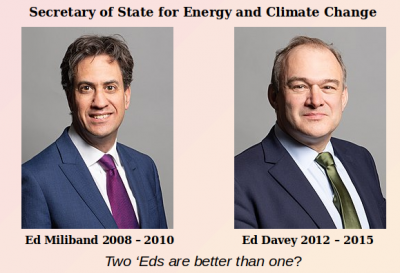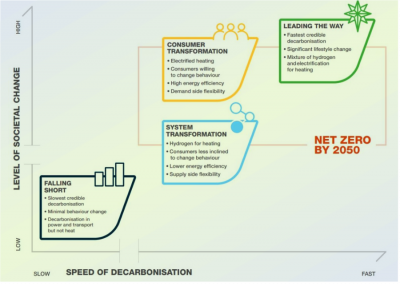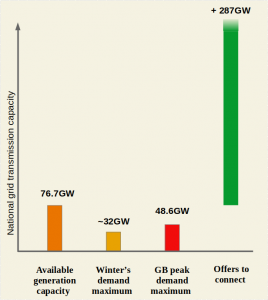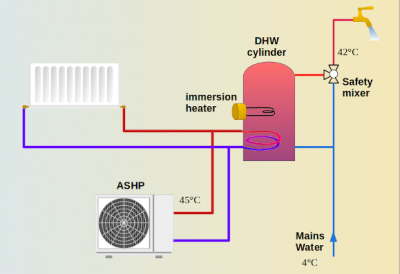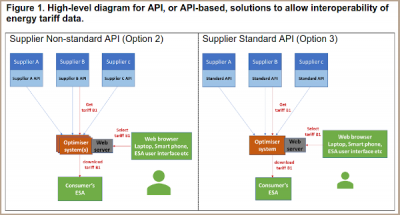I'll return to the actual DESNZ consultation in a while...
... but @eggnchips - those are questions which need presenting to Prospective Parliamentary Candidates (PPCs) for your constituency.
In the run-up to a general election I've previously put together an 'Energy Briefing' PDF which I've sent to all PPCs in my area, including those for neighbouring constituencies. I've been giving them an overview of local energy resources and usage, together with changes needed to present policy.
It's rare that they've had the time to find out these issues for themselves, so they're universally very grateful! 🙂
How they use that information is up to them, and will be affected by party politics and their manifesto of course.
But at least they can start from a common base of understanding of what's affecting the wider population.
Hint: They all know that I'm a floating voter with no party political allegiances.
If an electoral candidate believes that they've 'secured' your vote, then they won't need to keep talking to you, will they?!
This year my 'energy briefing' will be different.
I already have PPCs coming to see me and discuss energy matters.
So this year I'll be giving them a set of maps and graphs which support subjects we will already have discussed face-to-face.
The low quality of heat pump installations is obviously going to be one of the topics.
Alongside links to MCS, IET and Building Regs websites, PPCs will be given a selection of photos to help them understand what's actually happening.
And may I select one or two of your photos please?
Save energy... recycle electrons!
@transparent I don't want to get involved in the politics of all this at my age but ...
It's rare that they've had the time to find out these issues for themselves, so they're universally very grateful!
If you need to give these people background and dare I say, transparency, it is worthwhile looking at an old paper from Professor Ross Anderson.
Smart Metering – Ed Milliband’s Poisoned Chalice
He wrote a paper with "recommendations for how government can avoid the IT disaster which appears likely and which will become apparent by 2014–15" and how "Ed Milliband cooked the books" to make a case for smart meters appear economically viable.
Anderson also warned of the security issues involved with DCC and letting suppliers have control rather than DNOs. Of course, all this was ignored by the government.
Thanks for that reference @eggnchips
please allow me to respond....
That paper by Ross Anderson is undated, but the content indicates that it can't have been written after the General Election of May 2010. At the time of writing, Ed Miliband must've still been Secretary of State for Energy.
The specification for the Smart Meters now deployed in UK was substantially written in 2012.
I have a copy of the draft which was prepared for the European Commission, dated Jan 2013.
The Secretary of State for Energy 2012-15 was (Sir) Ed Davey MP, within the coalition government between Conservatives and Lib Dems.
The Functional/Technical specification v1.58 of 28th November 2014 reflects all the detail which was adopted and implemented by hardware/software manufacturers.
It was Ed Davey, not Ed Miliband, who steered the required legislation through Parliament in 2013/14.
The Smart Meter design team working within Dept Energy 2012-2015 took into account the deficiencies highlighted during the early trials in 2004-7.
A number of significant changes were made regarding which organisation was to be responsible for what.
Anderson writes "Britain is the only country mandating a centralized communications system feeding a centralised database."
That isn't now the case. GB has not implemented a single centralised database of all data collected from our Smart Meters.
DCC is overseen and constrained by the SEC, of which I'm a Member.
I briefly discussed the role of Smart Meters within Future Energy Strategy with Ed Davey in April 2015, when we happened to meet close to his home (!).
When he lost his seat the following month, the Smart Meter system designers became spread out across other institutions (DCC, Ofgem BEIS etc)
Ross Anderson's paper, in analysing the financial gains/losses of implementing Smart Meters, has assumed that the main purpose of Smart Meters is for billing.
Whilst the strategy pushed forward by Ofgem since 2015 has also majored on that aspect, it is one of seven main functions which the 2014 specification mandated.
We are using Smart Meters which still have 3 of those 7 functions not operational.
The features which are lacking are those which would be most beneficial to consumers, rather than the energy sector.
I wrote a submission on the subject of Smart Meters to the Commons Select Committee on Energy Security and Net Zero during their call for evidence of Sept 2023 "Keeping the Power On − Future Energy Technology Mix". Apart from describing the absent functionality, I also revealed billing errors from domestic Energy Suppliers. That statistical analysis is based on mathematical modelling by Simon1D, with whom I'd collaborated in identifying billing errors reported on the OVO Forum.
I am now developing (with others) future electricity system technology which will bring greater benefit to smaller consumers.
The predominant advantages of this strategy require features which have not yet been implemented, including:
- Nodal (locational) pricing based on data of energy mix and availability at the 33kV level
- that Nodal Pricing being implemented within ToU tariffs (incl those available to SMEs)
- live tariff data being stored in the Active Tariff Matrix of the ESMEs (Electricity Smart Meter Equipment units)
- use of the Auxilliary Load Control Switch mechanism within ESMEs for high-current domestic loads
and others which I cannot describe here for commercial reasons.
I have a vested interest in seeing Britain move faster and more positively along the path to Net Zero as described in the Future Energy Scenarios.
I've heavily committed to R&D of technology which is 'sub-optimal' in the present energy landscape.
As 'we' consider what we might write in response to the Government consultation on Delivering a Smart & Secure Energy System, lets note that the present Opposition Spokesman on Energy Security and Net Zero is Ed Miliband MP (Lab). Are we about to see this story come full circle?
Save energy... recycle electrons!
@transparent I don't think it makes any difference which politicians you look at. The government were refusing to provide information on a 13bn project.
They seemed to want to cover everything up. Have a look at Anderson's FOI request dated 7,April 2012. I cannot be bothered to precis so here it is in full.
It definitely deserved an answer which was not forthcoming. I wonder if things have changed since those days.
vvvvvvvvvvvvvvvvvvvvvvvvvvvvvvvvvvvvvvvvvvvvvvvvvvvvvvvvvvvvvvvvvvvvvvvvvvvvvvvvvvvvvvvvvvvvvvvvvvvvvvvvvvvvvvvvvvvvvv
Dear Department of Energy and Climate Change,
Please pass this on to the person who conducts Freedom of Information reviews, whom I understand is Catherine Bakhshi.
I am writing to request an internal review of Department of Energy and Climate Change's handling of my FOI request 'Smart meter ISOS' reference number 12/0404.
The Department has repeatedly represented the DCC project as being one that it has thought through carefully and for which a proper specification has been developed. Industry observers dispute this but dare not say so publicly for fear that the Department will act vindictively against their companies in the future. The only practical channel they have to express their concerns is via academics like myself.
I now understand that the ISOS document makes quite clear that the Department does not have a firm specification for DCC. It says in effect, "We're committed to spending a lot of money on a DCC; can you please tell us how we might do that?" This is absolutely the wrong way to do a public-sector IT procurement as it exposes consumers to the very strong risk that an extremely expensive and inappropriate system will be procured or that the system will not in the end be fit for purpose at all. Despite the fact that publication of the ISOS is likely to embarrass the officials who drafted it, there is an overwhelmingly strong public interest in its being published immediately so that public debate can be opened up on whether the DCC proposals will lead to anything like a competitive technical architecture, and whether they are likely to be able to support stated objectives such as demand response.
The argument from section 43(2) of the act is completely the wrong way round, as the consultation process has so far been managed by the Department so as to exclude the options that provide the best value for money, such as an open-standards-based system as implemented in Spain.
Public-sector IT has a long history of gold-plated procurements based on specifications evolved in private between SIs and officials, where the SI's interest in maximising lock-in combines with the civil service culture of risk aversion and the lack of engineering nous to result on systems that are too complex, that frequently fail, and that in any case provide poor value for other stakeholders. To get value for money it is essential that the other stakeholders – and in particular technically competent stakeholders – be able to see and criticize the process of requirements evolution.
Perhaps, had the specification working groups been managed differently, DECC would now have a stable specification that could be put to tender via an open and transparent process. I understand that ISOS makes clear this has not happened. It is in the overwhelming public interest for this to not be covered up.
The section 22 argument is also subject to a public interest test, without which any FOI request could be stonewalled by a claim that "we plan to publish this in 100 years when no-one will be around to be embarrassed". For a FOI request to be effective and for the Act to have the force and effect intended by Parliament, information must be made public while it is still timely. If a Department can delay publication of any embarrassing information until it's too late to matter, then the Act would be frustrated.
In this case the Department, having failed to come up with a workable specification for its flagship project, now appears to propose to go into a huddle with six vendors and say to them, "Well guys, what do you think you can actually build? After a completely opaque process, ministers and officials will favour one option or another, despite their not having either the engineering or economic skills in the department to make a rational choice. The chosen option will be put to a formal tender which will presumably be won by the SI which came up with it. This process may appear to provide the form of transparency but in reality the sale will have been closed by entirely opaque means. The Department argues that the public interest in the protection of the commercial interests of future service users requires that the tending process be kept confidential; this is completely perverse and wrong. The commercial interests of future service users, including my interests as a householder and electricity buyer, will be served by openness.
The purpose of this FOI request is to force into the open the ISOS so that taxpayers and consumers can see the real state of play with the smart meter procurement. A further FOI request will demand the responses sent in by the selected bidders, which will enable their proposals to be examined publicly so that their functionality and cost can be compared with the functionality and cost of other smart meter deployments in Europe and elsewhere.
So far the Department has been incurious about systems in other countries. This fits the pattern whereby managers in bureaucratic organisations avoid acquiring knowledge that might challenge local preconceptions and plans. Such selective attention and selective search are known to be two of the common contributory factors to administative disasters (see for example Robert Trivers "Deception and Self-Deception", case histories of the space shuttle disasters and the second Iraq war).
Given that the smart metering programme is as large an engineering programme as the UK has undertaken – at £10bn, its cost in real terms is the same as that of the channel tunnel – it is vital that such sources of administrative self-deception and likely project failure be mitigated to the greatest extent possible, and the best known way to do that is transparency.
I therefore ask for an urgent review of the decision not to make the ISOS available under FOI and I request the reviewing officer to raise the matter directly with the accounting officer and the Secretary of State because of the vast sums of money involved and the massive public interest. Indeed, given the recent failure of nuclear policy, the smart metering project is what the Department has left; very grave damage would be done to the Department's credibility should this project end in failure too, and most industry observers now expect it to. In the circumstances, an opaque tendering process is the about the worst thing the Department could do.
A full history of my FOI request and all correspondence is available on the Internet at this address:
http://www.whatdotheyknow.com/request/sm...
Yours faithfully,
Ross Anderson
Posted by: @eggnchipsI don't think it makes any difference which politicians you look at. The government were refusing to provide information on a 13bn project.
My intention is to point out that the Smart Meter strategy which got implemented was the Davey model, rather than the earlier Miliband version to which Anderson had raised objections.
I suppose we must assume that Anderson had continued to raise concerns during the time when Chris Huhne was Secretary of State for Energy (May 2010 - Feb 2012). But there's no indication of any Huhne-era thinking in the technical specifications or regulations which received Parliamentary approval.
The authority of DCC and its access to (unencrypted) data were greatly reduced from the early trials and proposals during the Miliband period.
Its possible that this is down to Anderson's tenacity.
What we've ended up with now is very workable.
But it needs more momentum from Ofgem to ensure that the Energy Suppliers fully implement what the Smart Meter documentation defines.
As matters now stand, the immediate future direction of our energy strategy is more in the hands of ISOP than government.
To change course, the next government would have to amend the Energy Act (2023), and I can't see much appetite to do so.
That's the basis on which I will be responding to the live Consultation on Delivering a Smart & Secure Energy System.
Save energy... recycle electrons!
Good luck with that @Transparent. However, in the light of the latest Government systems scandal (Horizon), I would leave any mention of Ed Davey out of the recommendations.
I don't think I'll need to refer to past iterations of energy strategies @eggnchips
This consultation is all about the future... stuff that's beyond the horizon.
If necessary I'll call the next iteration of the Smart Meter system ▓▒▒▒▒ – after the next-but-one Secretary of State for Energy Security and Net Zero 🤔
Save energy... recycle electrons!
"I don't think I'll need to refer to past iterations of energy strategies"
So Ofgem has not learned any lessons from the past. I suppose any future tendering processes will be just as un-regulated and opaque as the previous ones?
I wonder how many of us actually submitted a response to the Smart & Secure Electricity System by the deadline of 23:59 on Fri 21st ?
I'm aware that someone else attempted to, and was working right up to the last minute... because I found a glass slipper on the stairs.
Here's my take on things:
The SSES Consultation was divided into three sections.
The Energy Smart Appliances (ESA) paper (58 questions) Proposals here for Smart Appliances which will be switched off/on according to demand
The Licencing Regime paper (56 questions) Proposals here for a Licensing Scheme for Load Control
The Time of Use Tariff paper (12 questions) Proposals here for Minimum Viable Products (MVP) which will respond to Time of Use Tariffs (TOUT)
I didn't attempt Paper-2, so my maximum grade will only be a C. 😥
The proposals are 'Big Brother on Steroids', but so wide-ranging and deep in technical content that I doubt there are many people who could've responded.
They have interpreted the phrase "Demand Side Response" (DSR) as a mechanism by which Commercial Companies (probably Suppliers) will impose control over Energy Smart Appliances (ESA) in the home. It's an extension of the concept behind 'Smart EV Chargers', but doesn't require further Parliamentary approval because they sneaked it into the Energy Act (Nov'23).
Moreover, the switch-off period may coincide with that when an anti-legionella cycle would otherwise have occurred.
The householder would receive no alert to inform them that the the cycle hadn't occurred, because the power was off.
DESNZ are to convene a Technical Governance Group who will oversee the mechanism by which Net Zero is 'imposed' on the general public. But they expect that group to be comprised of professionals within the energy sector, without representation from Local Authorities, community energy groups or the public. Do we think that Energy Sector regulatory specialists would recognise a potential threat of Legionnaires Disease, or know how to resolve it?
She has alerted Environmental Health (District Council level) and Public Health (County Council level).
That requires years of work to define communication standards, data security and expensive certification for products.
They start by ruling out the use of Smart Meters, which means they don't yet know about the Randomised Offset to the Tariff Table. We've discussed that here in the topic about Incorrect Billing of Customers with a Smart Meter.
They then consider four different ways by which customers can choose a TOUT and link their home MVPs to it via a 'universally agreed API'.
That's a complex issue, requiring discussions across many separate organisations, including EV manufacturers for access to in-car data.
Such an approach could provide better security, but add a further expense to electricity supply.
This diagram is taken from p.19 of the Proposal Guidance documents, when discussing alternative approaches:
Save energy... recycle electrons!
@transparent I for one did not send any comments or ask any questions in this consultation. It is not that I would feel intimidated, just that I have absolutely no in-depth knowledge of the subject and fear anything I submitted would have been mere noise. I would rather that others with a great deal more knowledge on the subject spoke up for me - as I believe you have done yourself for which I say ‘Thank You’.
I do find it worrying though that we can have large organisations supposedly working on our behalves who have huge holes in their knowledge and experience yet are responsible for future plans that affect us all (and the whole world) so fundamentally in the future. Is this the point at which we start uttering ‘Be Afraid, be Very Afraid’? Regards, Lazy Toodles.
Toodles, heats his home with cold draughts and cooks food with magnets.
Posted by: @toodlesI do find it worrying though that we can have large organisations supposedly working on our behalves who have huge holes in their knowledge and experience yet are responsible for future plans that affect us all (and the whole world) so fundamentally in the future.
I think you just defined the current system of democratic government as enacted in the UK. I believe Sir Winston Churchill was - perhaps erroneously - credited with the quote which, paraphrased, is "It is the worst possible system, except for all the others."
105 m2 bungalow in South East England
Mitsubishi Ecodan 8.5 kW air source heat pump
18 x 360W solar panels
1 x 6 kW GroWatt battery and SPH5000 inverter
1 x Myenergi Zappi
1 x VW ID3
Raised beds for home-grown veg and chickens for eggs
"Semper in excretia; sumus solum profundum variat"
@transparent I did comment but I would get an E at best since I didn’t answer all of the questions in sections 1& 3 and didn’t touch 2.
My input was to be anonymous but I’ll happily state that my comments were along the lines of a customers express permission must be required, safety must come first and why reinvent wheels when control protocols are available commercially. I’m particularly sensitive to the hackers paradise that such a central system could become.
As background chatter I've been on technical standards committee a couple of times and it requires extreme technical insight which the governmental members present didn’t have. On another occasion a colleague was on a standard body and it needed the brightest and most politically acute (for commercial exploitation by competitors) person we had. Not a civil service role.
2kW + Growatt & 4kW +Sunnyboy PV on south-facing roof Solar thermal. 9.5kWh Givenergy battery with AC3. MVHR. Vaillant 7kW ASHP (very pleased with SCOP 4.7) open system operating on WC
- 27 Forums
- 2,495 Topics
- 57.8 K Posts
- 386 Online
- 6,220 Members
Join Us!
Worth Watching
Latest Posts
-

RE: Electricity price predictions
I have often thought the same. In Italy (I am told) th...
By JamesPa , 2 minutes ago
-

RE: Oversized 10.5kW Grant Aerona Heat Pump on Microbore Pipes and Undersized Rads
As I mentioned earlier most radiators have a power outp...
By JamesPa , 25 minutes ago
-

RE: Our Experience installing a heat pump into a Grade 2 Listed stone house
@travellingwave Looking forward to hearing the rest ...
By MK4 , 1 hour ago
-
RE: Solis inverters S6-EH1P: pros and cons and battery options
As a side note I observed the the charge/discharge time...
By Bash , 1 hour ago
-
RE: Testing new controls/monitoring for Midea Clone ASHP
@benson Thanks for new graph. Initial reaction is that ...
By Tasos , 1 hour ago
-

RE: Humidity, or lack thereof... is my heat pump making rooms drier?
That’s my pleasure, @andrewj. The only challenge now is...
By Majordennisbloodnok , 10 hours ago
-
RE: What determines the SOC of a battery?
@batpred Ironically you didn't have anything good to...
By Bash , 12 hours ago
-
RE: Setback savings - fact or fiction?
True there is a variation but importantly it's understa...
By RobS , 12 hours ago
-

Below is a better quality image. Does that contain all ...
By trebor12345 , 12 hours ago
-
Sorry to bounce your thread. To put to bed some concern...
By L8Again , 12 hours ago
-

@painter26 — they (the analogue gauges) are subtly diff...
By cathodeRay , 13 hours ago
-
RE: Struggling to get CoP above 3 with 6 kw Ecodan ASHP
Welcome to the forums.I assume that you're getting the ...
By Sheriff Fatman , 20 hours ago
-
RE: Say hello and introduce yourself
@editor @kev1964-irl This discussion might be best had ...
By GC61 , 21 hours ago
-

RE: Getting ready for export with a BESS
I would have not got it if it was that tight
By Batpred , 2 days ago
-
RE: Need help maximising COP of 3.5kW Valiant Aerotherm heat pump
@judith thanks Judith. Confirmation appreciated. The ...
By DavidB , 2 days ago
-

RE: Recommended home battery inverters + regulatory matters - help requested
That makes sense. I thought better to comment in this t...
By Batpred , 2 days ago
-
Bosch CS5800i 7kW replacing Greenstar Junior 28i
My heat pump journey began a couple of years ago when I...
By Slartibartfast , 2 days ago
-

RE: How to control DHW with Honeywell EvoHome on Trianco ActiveAir 5 kW ASHP
The last photo is defrost for sure (or cooling, but pre...
By JamesPa , 2 days ago
-

RE: Plug and play solar. Thoughts?
Essentially, this just needed legislation. In Germany t...
By Batpred , 2 days ago
-
RE: A Smarter Smart Controller from Homely?
@toodles Intentional opening of any warranty “can of wo...
By Papahuhu , 2 days ago
-
RE: Safety update; RCBOs supplying inverters or storage batteries
Thanks @transparent Thankyou for your advic...
By Bash , 2 days ago
-
RE: Air source heat pump roll call – what heat pump brand and model do you have?
Forum Handle: Odd_LionManufacturer: SamsungModel: Samsu...
By Odd_Lion , 2 days ago
-
RE: Configuring third party dongle for Ecodan local control
Well, it was mentioned before in the early pos...
By F1p , 3 days ago

